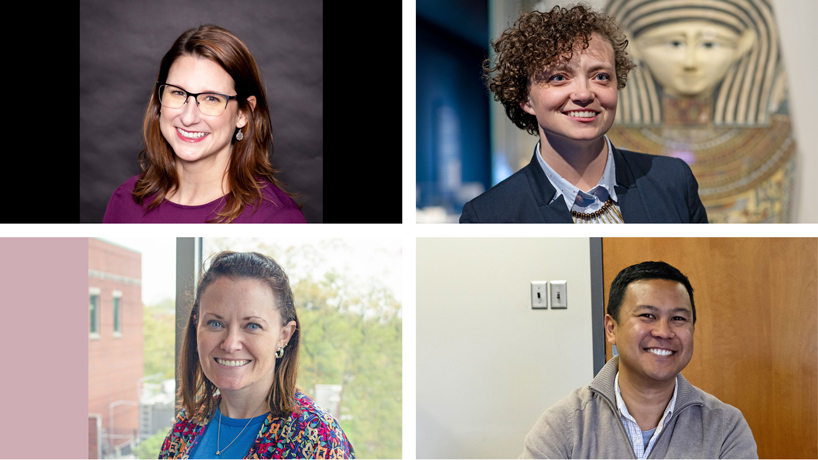
UMSL faculty members (clockwise from top left) Lindsay Athamanah, Anne Austin, Adriano Udani and Bettina Casad will receive a combined $98,000 in funding from the University of Missouri System to further their research. The funding comes via the Research and Creative Works Strategic Investment Program. It is meant to provide seed money for preliminary work, which can then be used to generate external funding from federal agencies, foundations and donors. (Photos by August Jennewein)
Top University of Missouri–St. Louis researchers in the areas of arts, humanities and social and behavioral sciences received a boon to their work last week thanks to the University of Missouri System.
The UM System’s Research and Creative Works Strategic Investment Program will provide a combined $98,000 in funding to four UMSL faculty members – Anne Austin, assistant professor of anthropology; Lindsay Athamanah, assistant professor of special education; Bettina Casad, associate professor of psychological sciences; and Adriano Udani, associate professor of political science.
As part of the program, UMSL will provide 25 percent in matching funds.
Overall, the strategic investments total more than $630,000, with more than $512,000 contributed in research awards from the UM System and a match of approximately $118,000 coming from the UM universities. In total, 23 innovative projects at the four universities will receive funding.
The goal of the program is to provide seed money for preliminary work, which can then be used to generate external funding from federal agencies, foundations and donors.
“As a land-grant university, research is at the very core of our mission,” UM System President and MU Chancellor Mun Choi said. “Despite the financial challenges presented by the pandemic this year, we’re proud to make these strategic investments in the kinds of projects that delve into the intellectual and cultural ideals that help us better engage in and improve our society.”
Athamanah and Udani won the largest awards at UMSL with each receiving $30,000.
With her project, “Promoting Equity and Inclusion with Peer Mentoring,” Athamanah will explore the experiences, perspectives and social networks of participants in a peer mentoring program in a postsecondary education programs for young adults with intellectual and developmental disabilities.
“I am honored to receive this grant because I will be able to create an inclusive peer mentoring program for the UMSL Succeed students and UMSL undergraduates,” Athamanah said. “My research focuses on exploring inclusive social opportunities and the potential impact these opportunities have on awareness, knowledge and friendships between young adults with and without intellectual and developmental disabilities.”
In addition to her own research, Athamanah is part of the team in the College of Education that recently secured a $2.1 million Department of Education grant to expand the UMSL Succeed Program.
Udani’s research project, “Latino Asylum Seekers as Policy Research Partners,” aims to develop a shared policy agenda and action plan among Latino asylum seekers in St. Louis. The project will partner with Migrant and Immigrant Community Action Project and the Interfaith Committee on Latin America in addition to asylum seekers.
“This project has important contributions by building processes and systems that center oppressed groups in decision-making and systems change,” Udani said. “IFCLA, MICA and I are extremely excited and grateful for UM System support for this project that will directly and equitably pay asylum seekers for their time, creativity and problem-solving to co-produce knowledge with us.”
Marginalized groups such as asylum seekers have had minimal opportunities to address policies that affect them. To change that, Udani will treat asylum seekers as expert partners – co-authors and co-investigators – rather than subjects of a study.
“Typically, in political science, immigrants are often positioned as participants in studies or respondents to surveys that are designed by researchers,” he said. “In immigrant service ecosystems, asylum seekers are also often positioned only as service consumers or storytellers of oppression, which can perpetuate a common misperception: Immigrants and migrants should just be grateful that they receive any assistance at all.”
Casad received $25,000 for her project, “Improving Minority Health by Inducing Empathy.” It will examine the role empathy might play in bridging racial health disparities due to prejudice and discrimination. She posits that inducing empathy can increase intergroup cooperation and reduce implicit racial bias.
The University of Missouri Research Board previously awarded Casad funding to investigate the effects of threatening intellectual environments in STEM classrooms.
Austin was awarded $13,069 for her project, “Revealing the Tattoos of Ancient Egypt.” The goal of Austin’s work is to the reveal the practice of tattooing in ancient Egypt through the study of mummies in tombs at Deir el-Medina. By identifying the age, sex and health of the mummies and symbolism present in the tattoos, she hopes to interpret the tattoos’ meaning and purpose.
“This grant will fund my team’s work in Egypt as we explore and identify tattoos that have been hidden from the world for thousands of years,” Austin said. “Receiving this grant means so much to me. It not only represents the support of the UM System for my research, but also the collective accomplishments of the UMSL community. From grant writing to mentorship to fieldwork support, UMSL has shown their dedication to making our students and faculty top researchers in our fields. I’m excited to represent UMSL internationally as I work to understand tattooing, both in the past and today.”
This project is an extension of her previous research in Egypt where she used infrared cameras to identify more than 30 distinct tattoos on a female mummy. The discovery garnered interest from news outlets around the world after she presented the findings at a professional conference in 2019.
Strategic Investment Program Awards:
Lindsay Athamanah, special education, “Promoting Equity and Inclusion with Peer Mentoring,” $30,000
Anne Austin, anthropology, “Revealing the Tattoos of Ancient Egypt,” $13,069
Bettina Casa, psychological sciences, “Improving Minority Health by Inducing Empathy,” $25,000
Adriano Udani, political science, “Latino Asylum Seekers as Policy Research Partners,” $30,000














